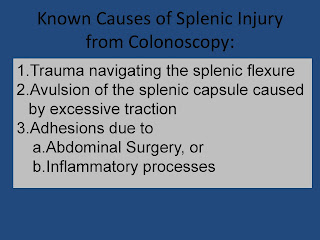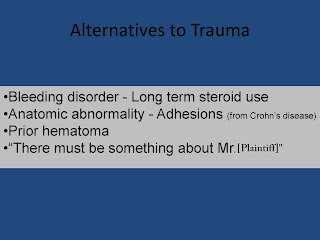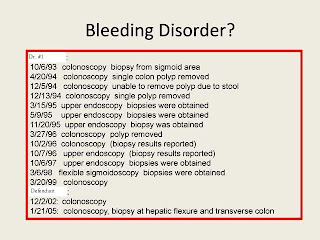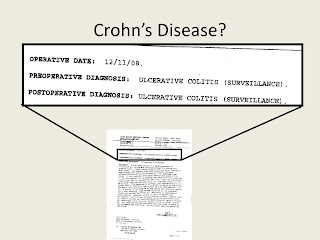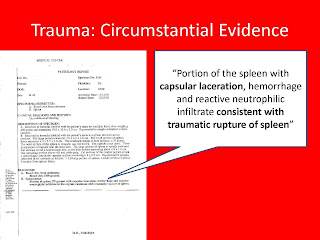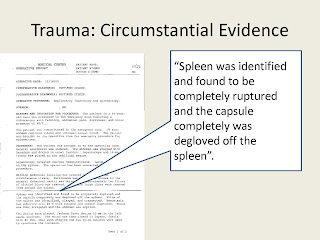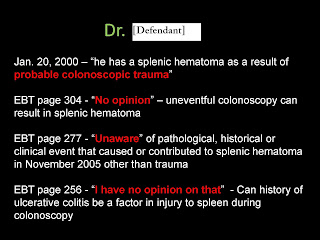January 14, 1993
A very lengthy trial ended today.
The case involved a claim of Obstetrical negligence causing avoidable brain damage. The child has cerebral palsy.
There were two different Obstetrician defendants each represented by his own attorney. One rendered care to the mother during her pregnancy. The claim against him was that he failed to take appropriate steps when the mother complained of decreased fetal movement. The other was providing coverage for the first when the mother called to complain of an emergency; she had felt no fetal movement whatsoever for many hours. He told her to meet him at the hospital, which she did. He monitored the baby’s heart rate for three hours and ultimately delivered the baby by Cesarean section. The claim against him was that he failed to recognize fetal distress and delayed the Cesarean section.
We started taking testimony in early December 1992. My Obstetrical expert was on the witness stand on December 16, 1992. The defense lawyer brought boxes of transcripts of his prior testimony into the courtroom on a hand truck. He spent all afternoon using those transcripts for what trial lawyers call “collateral attack”. In plain English, it means throwing dirt. The lawyer is trying to discredit the witness using information which is not directly related to his testimony on direct examination, but which may show bias, prior bad acts or otherwise reflect poorly on credibility.
The attack was withering, and by day’s end, he had not finished, meaning that the witness would have to come back another day. When the Judge told that to the jury, they sent him a note. They wanted to take a break for the Christmas and New Year’s holidays and come back in January to hear the rest of the case.
The Judge read the note to me and the other two lawyers. We conferred and decided it was best to accede to the jury’s request. It was the luckiest thing that possibly could have happened to me. My wife and I had scheduled a vacation with our son who was four years old at the time, to go to Disneyworld in Florida during that holiday season. As the departure date neared and the trial was nowhere near completion, we made arrangements for my Mom to go in my place. Thanks to the jury, I was able to travel with my family. Sorry, Mom.
The schedule was set; we would interrupt the trial until January 4. On that day, today’s witness would return following which defense counsel would present their witnesses, followed by summations and charge.
We were all amazed when the jury did in fact return. Needless to say, my adversary had used the time well, and was armed to the teeth to conclude his cross examination.
We were able to finish taking the testimony and complete the trial. The summations ended yesterday afternoon. The Judge charged the jury this morning.
Shortly before 5 o’clock we were advised that the jury had reached a verdict. The court clerk held a copy of the questions that the jury has been given to answer. He asked the foreperson of the jury to rise and read the first question and asked “What is your answer?” He proceeded in the same way until all of the necessary answers had been given.
Today I enjoyed the biggest victory of my career to this point; the jury awarded my client $10 million dollars and they found both defendants 50% responsible.
After the jury had been excused some routine legal matters were addressed. The lawyers almost always shake hands and congratulate one another on a job well done. Today was no exception. At one point, the Judge observed to his law secretary aloud, “I believe this is the largest verdict we’ve ever had.”
One of my adversaries (the guy with the hand truck) is a little bit of a wise guy. Don’t get me wrong, he’s an extremely talented and very dangerous person to try a case against. During the course of the trial, he and the attorney for the other doctor cooperated to the greatest extent possible, as is very common.
Immediately upon hearing the Judge’s remark and without missing a beat, he turned to the other attorney and said “Congratulations!” Both were smiling broadly as they gave each other a hand shake from above their heads to below their waists.




